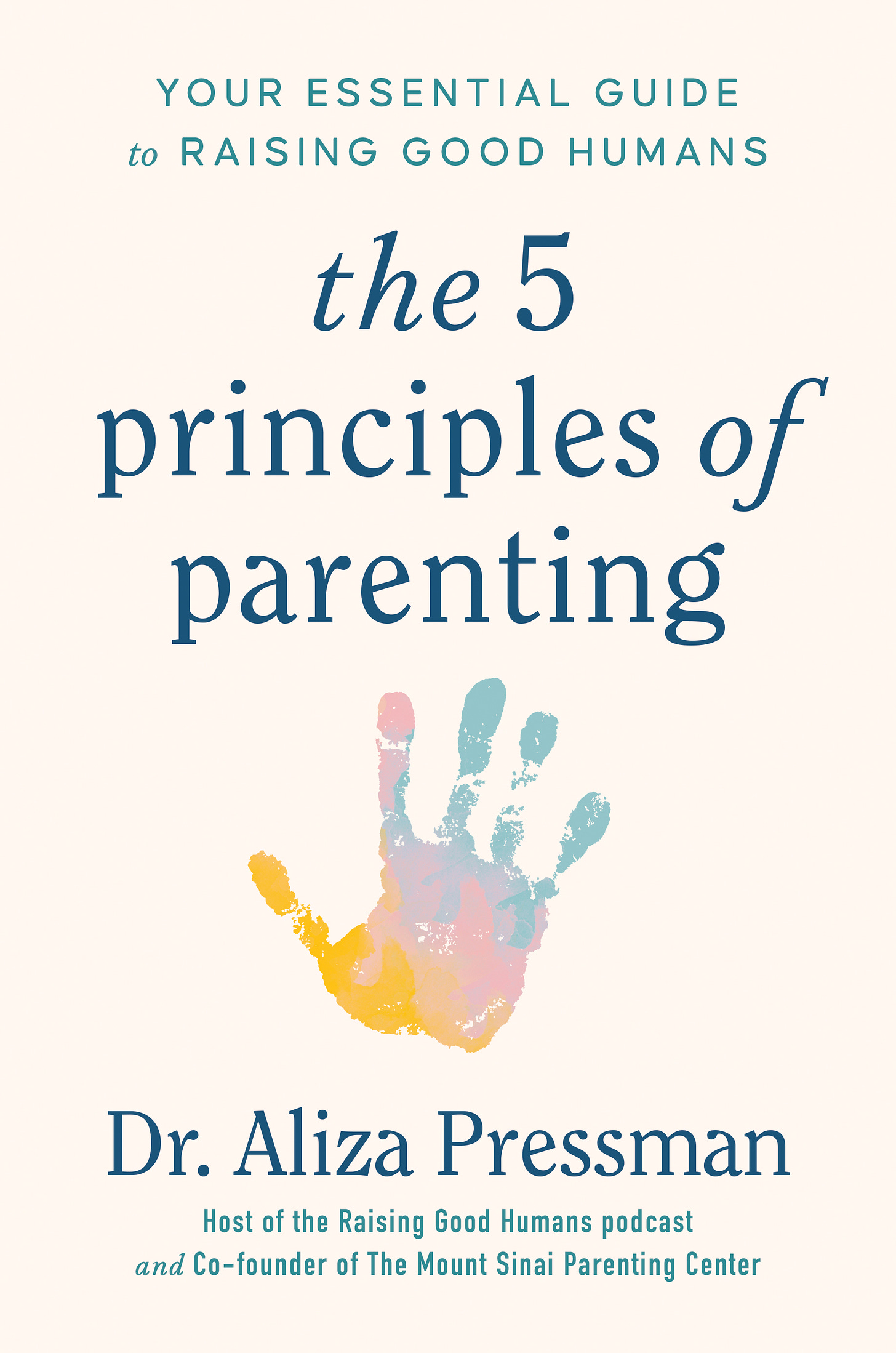Thanks for reading Raising Good Humans on Substack! My first book, The Five Principles of Parenting: Your Essential Guide to Raising Good Humans is now available for preorder here. All pre-orders will allow for access to exclusive LIVE events and will be eligible for exclusive bonus content this Fall. I am SO GRATEFUL for you and SO excited to get this book out into the world!

I LOVE when I come across science that supports what we already know and experience as parents. Today’s episode of the Raising Good Humans Podcast is exactly that! My discussion with neuropsychologist Dr. Julia Digangi is an eye opening look at our responses to everyday parenting challenges (what she calls, death by 1000 papercuts) through the lens of neuroscience and energy.
Here are my 5 key takeaways:
So often, we are using our own brain against us! As Dr. Digangi explains, we have 3 engines in our brain: thinking, behaving, and feeling. When these engines work against each other, for example, a feeling that we don’t allow ourselves to act on, or a thought that we refuse to acknowledge, we actually engage in self-division. This division can lead to burnout, to depression, to anxiety, and to general unhappiness in our own life. Instead, we need to focus on an integrated brain that works together to serve our overall well-being.
“An integrated brain is a brain that does what it feels and feels what it does. And when you're — when you're acting in alignment, when you're using the power of your thinking, you're feeling and you're behaving to move you through time and space in one direction, you feel great and you are unstoppable.” - Dr. Julia Digangi
We can only control ourselves, but our leadership is a powerful influence on our children. Though we know that we can’t make our children think, feel or act the way we want them to, we have a very important role in helping to influence their development by modeling our own. Dr. Digangi defines leadership as “whoever has the strongest emotional energy in the room.” Just like what we have understood about co-regulation for the last decade, this discussion helps us remember that our own work is essential to being able to parent from a place of regulation and insight.
“We can't control sensations in other people's nervous systems, but we absolutely can influence them. Emotion is a thing of contagion. We catch each other's emotions the way we catch a cold.” - Dr. Julia Digangi
Doing the work for ourselves is essential to our parenting, not a luxury. I have written about this topic before, but it bears repeating. We have to put our own oxygen mask on first to be able to show up for our children, to be able to help them to learn and grow from our example. This is not to say that all of the pressure is on us, but instead, that we can help both ourselves and our children for the long term when we do the work to support ourselves.
“The fastest, most efficient, most neurologically aligned way to build a healthy, worthy, self-loving child is to develop a healthy, worthy, self-loving relationship with yourself.” - Dr. Julia Digangi
Not letting our emotions out, leads to a constipated emotional system. Dr. Digangi talks about the efficiency of our bodies in releasing all of our waste - from our stool, to carbon dioxide or a virus - except for our emotional waste. Sitting with our own unresolved feelings, with the root causes of our pain (and trauma), allows them to fester and to explode in ways we don’t anticipate. The fight in the grocery store isn’t about that moment, but the result of a build up over time. As we discuss, it is the everyday stressors that often show us just how much unresolved emotional garbage we have! You may think, “Why is this making me so angry?” and realize that you can’t even remember how any one moment got you so out of control.
“If you spend 5 years of your life, 10 years of your life, 50 years of your life, shoving emotional trash down in your system, you become emotionally congested, emotionally constipated. Your emotional plumbing is so filled with junk that when something happens that's wildly ordinary, it really brings us to our knees.” - Dr. Julia Digangi
Like we train our muscles at the gym, we have to train ourselves to tolerate hard emotions and ride through them. Sitting with discomfort is NOT something we are very good at - for ourselves OR for our children. But we need to be able to do this work, to tolerate our own emotions, to get to the other side and a more integrated brain. The muscle shaking that we experience at the gym is considered progress, while the emotional pain of sitting with something instead of ignoring it is often unbearable. By retraining our expectations, by forcing ourselves to sit with discomfort and survive it, we can make real, and lasting, change.
“What happens to most of us is we do it [practice regulating] for maybe a day, we can tolerate it for 15 minutes, and then the heat inside of our own nervous system gets so big that then we kind of blow our top.” - Dr. Julia Digangi
Check out these articles for more!
A quick reminder to pre-order my first book, The Five Principles of Parenting! In it, I’m helping you to translate science into everyday challenges, and when you pre-order you get special benefits - including a virtual seminar, and custom content specifically made for you. AND when you pre-order, you are helping me SO MUCH. Every single person who pre-orders the book, helps book sellers and shops to see that demand is high and convince them to stock The Five Principles of Parenting on their shelves. I need your help to make sure that happens, and so I promise special benefits to make it worth taking the lap to pre-order today.









Love this: We can only control ourselves, but our leadership is a powerful influence on our children. Though we know that we can’t make our children think, feel or act the way we want them to, we have a very important role in helping to influence their development by modeling our own.
I’ve preordered my book but don’t have social media. Is there another way I can get the free chapter?